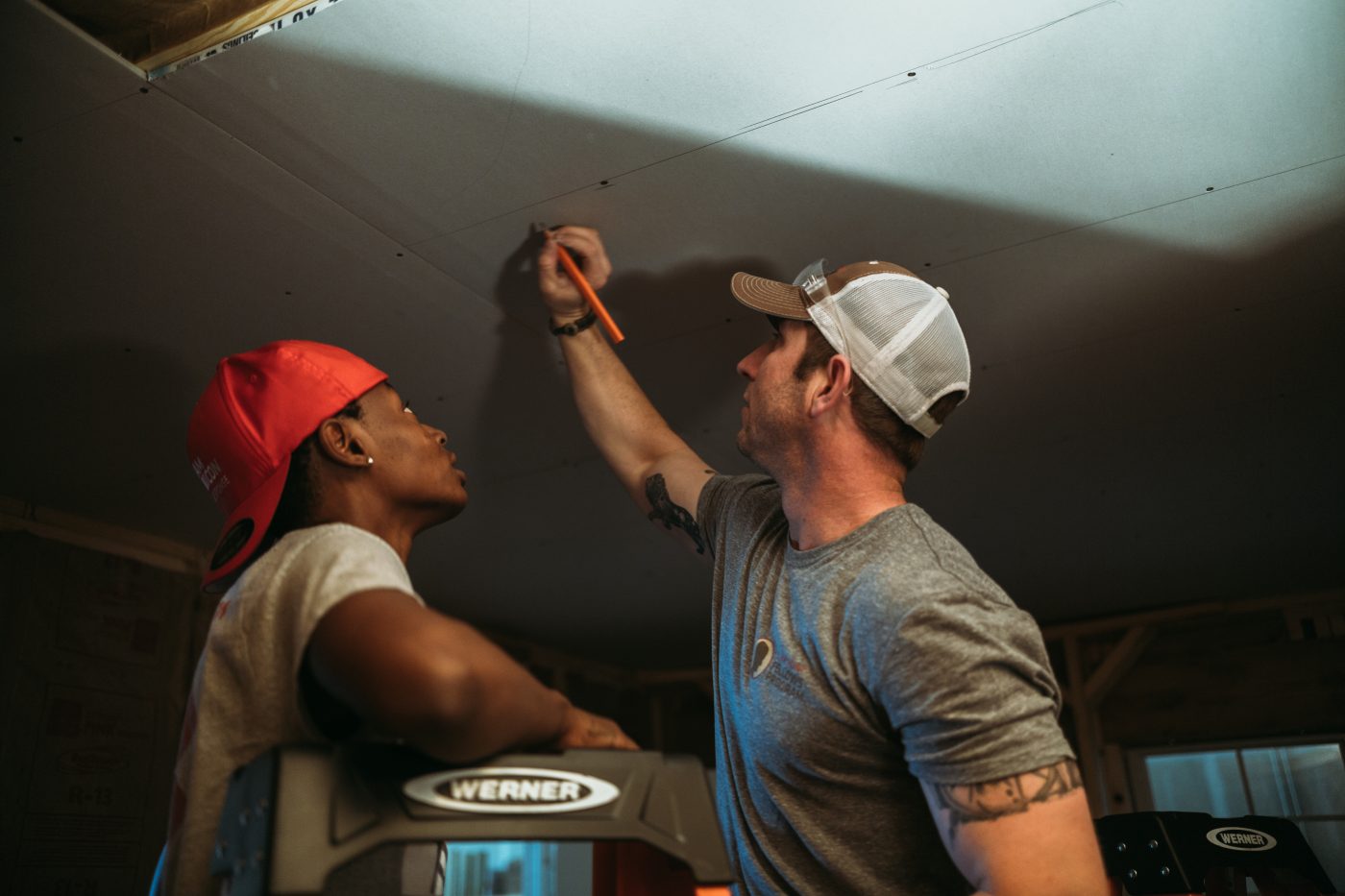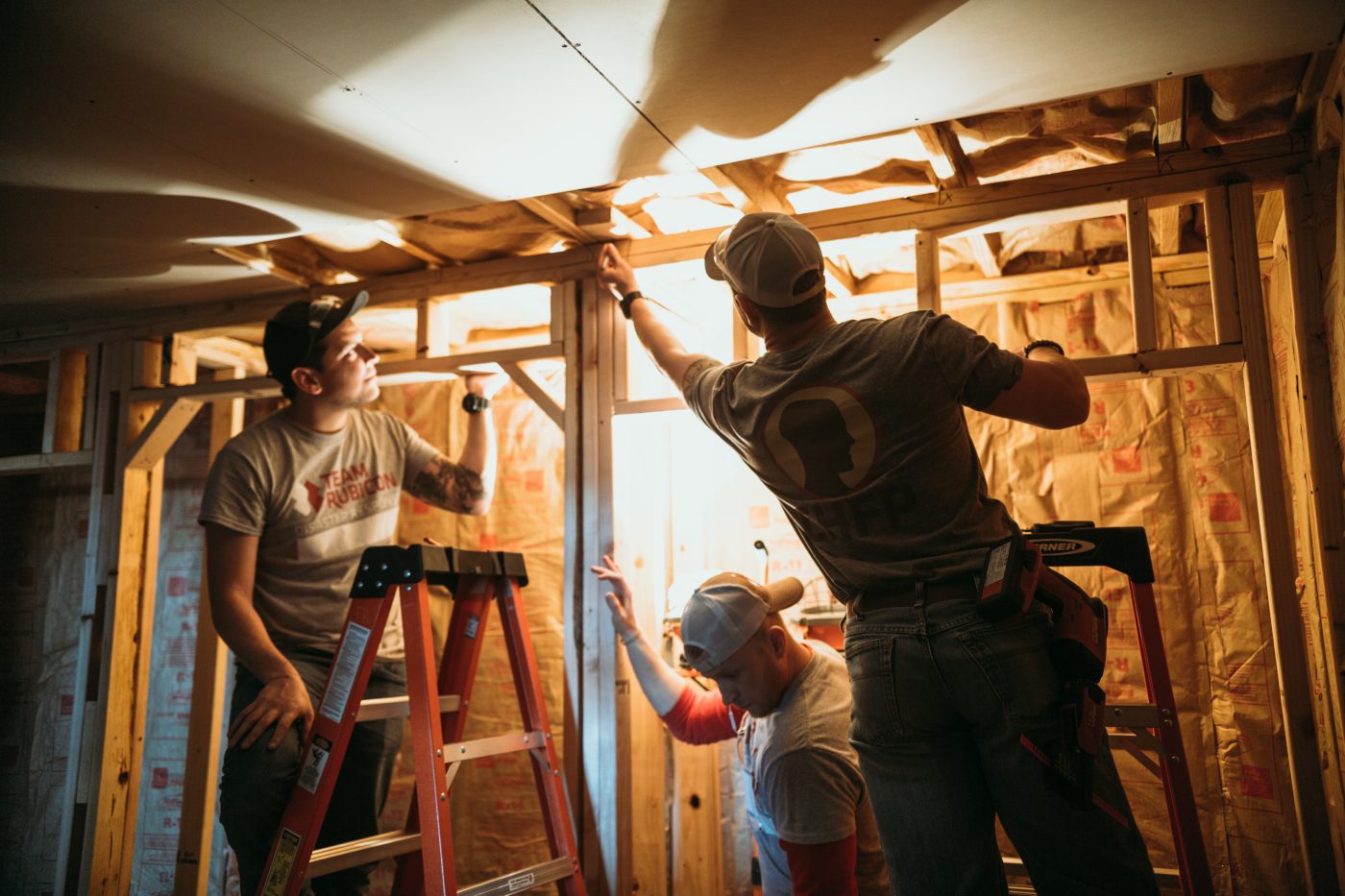An email in November, 2017, started this amazing journey.
It had only been a few weeks since I’d volunteered on my first Team Rubicon operation when I got the email in my inbox. They were looking for “tenacious, adaptable individuals” to help lead a rebuild pilot program in Houston, Texas, as part of Team Rubicon’s Cohort 6 of the Clay Hunt Fellows Program, and they were soliciting applications. It was time to see if I could embody Team Rubicon’s mission statement and “[leverage my] skills and experience to help people prepare, respond, and recover from disasters and humanitarian crises.” It felt like a calling, and I knew I had to try, but I wondered, without residential construction experience, how would I be of help managing this brand new program?
So I submitted my application. Two months later, I was accepted to the fellows program.

Brian Calcagno and a fellow CHFP alum on a home rebuild site in Houston, Texas.
From the very beginning of my time with the year-long cohort, it was evident that Team Rubicon was taking on a monumental endeavor: Rebuild 100 homes in two years using an all-volunteer workforce which would be managed and run by military veterans with no residential construction experience. The gravity of what we were about to do didn’t sink in until later that year. While there was ambiguity in how this would play out over the next year, there was also trust and confidence placed in myself and the other Clay Hunt Fellows. We each had what it would take to accomplish the goal of building 100 houses in two years.
From our time in the military, we had the leadership, critical thinking skills, and experience that we’d need. Now, it was time to draw from it and navigate these uncharted waters.
In February 2018, three months after I got the email to apply, I went to work with my cohort in Houston. I had been an Aviation Officer in the California Army National Guard, and I put that experience to use almost immediately. For the Houston Rebuild, I was going to be one of two Volunteer Coordinators on the Project Management Team. This job consisted of vetting, dispatching, scheduling, feeding, and transporting all Greyshirts and unaffiliated volunteers who passed through Houston and on to specific build sites each week. We interacted with almost every volunteer during the entire life-cycle from sign-up to the post-deployment survey.

In many ways, the Volunteer Coordinator role paralleled a position that I’d held in the military as the Assistant Operations Officer for an Aviation Support Facility. In that job my work had consisted of scheduling and managing over 70 aviators and 15 aircraft on a daily basis. That balancing act required critical thinking and conflict resolution skills. When the Project Manager of the Houston Rebuild “handed the keys” of the Mobilization Tool to myself and my Volunteer Coordinator counterpart, that too took a lot of critical thinking to modify an existing process to fit into a brand new pilot program.
We adapted a Google form and spreadsheet that had been used for Team Rubicon response operations in the past to fit within our five-day-a-week construction schedule. With the help of Kate Browne and Kristen Cotter, who were then both on TR’s membership team, we created a product that automated a majority of volunteer coordination, eliminating hours of labor previously done by myself and my counterpart.
We had a few hiccups, bumps and bruises along the way, but in one year, we mobilized over 1,100 volunteers who worked a combined total of 25,000 hours, which allowed 32 families to come home after one of the worst disasters to hit American soil.
In less than 10 months, we had turned a long-term dream into a fully operational capability.
There is no doubt in my mind that those skills and experiences from my time in the service helped guide me through the year. Looking back, it was one of the most challenging and rewarding experiences of my life. I am humbled by the passion that our Greyshirts bring everywhere they serve. They continue to motivate me to help someone on their worst day.



